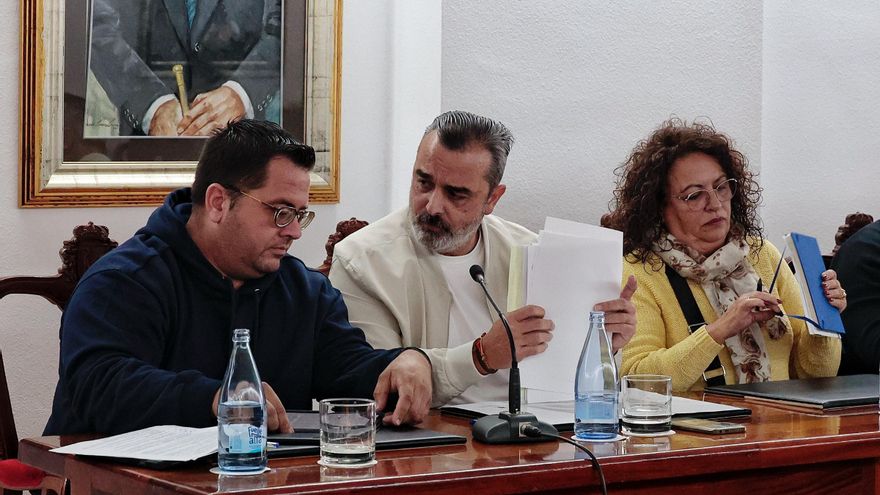
The recent political shift in Arona has placed Nauzet Fariña, a 38-year-old local from Las Rosas, at the centre of attention. As the sole representative of Nueva Canarias, he has unintentionally become the crucial thirteenth councillor on the Arona Town Council, pivotal to governance. He speaks out for the first time following the dismissal of four other councillors from Arona by the mayor, Fatima Lemes, who subsequently incorporated two representatives from Vox. He expresses that he does not feel pressured by his newfound prominence and maintains his “unaltered” beliefs regarding the administration of the municipality, which is one of the economic powerhouses of the Canary Islands and the fifth most populous, amidst this new political turbulence.
Nauzet Fariña knows that with his vote, he could provide the majority needed for the new local government coalition to implement its major proposals, including the budget. The newly formed coalition led by the popular Fatima Lemes consists of 12 councillors: PP (5), CC (5) and Vox (2). The mayor requires Fariña’s backing to secure a vital majority that will bolster her initiatives.
Moreover, Fariña could play a pivotal role if PSOE and Más por Arona—the other council bloc—manage to set aside their differences and unite to displace CC-PP-Vox via a motion of censure. With his cooperation, they could achieve the necessary majority of 13: the 8 from PSOE—the highest-voted party in the May 2023 elections—along with 4 from Más por Arona and the thirteenth vote from NC.
PSOE and Más por Arona are striving to reconcile their positions—it’s worth noting that the leader of the latter is affiliated with the former—predominantly focusing on securing support from NC due to personal affinities. However, Nauzet Fariña’s stance seems less straightforward. “I don’t believe another government change, another political shift, is beneficial for Arona, which, after years of instability, desperately needs calm and continuity,” Fariña asserts.
He also appears impervious to the indirect pressures that have started to surface, notably from the regional leadership of PSOE. Last Thursday, Ángel Víctor Torres, the general secretary of the Canarian socialists, remarked that his party should aim for “a sufficient majority in Arona” to counter the presence of the far-right in the local government. The only avenue available lies in PSOE and Más por Arona gaining at least Fariña’s external backing to present a motion of censure. In his comments to the SER network, Torres indicated he was “absolutely convinced” that NC “is not going to join a government that includes Vox” and would support another progressive alternative.
“I will not take on the responsibility of resolving the issues that led to PSOE’s exit from this municipality two terms ago and the subsequent loss of its absolute majority,” Fariña concluded. The thirteenth councillor further declared that a PSOE-Más por Arona alliance is not feasible “at this moment.” “There are significant personal differences.” It should be remembered that the representatives of Más por Arona created this formation after departing from PSOE during the previous term, with the breaking point being the decision made by the then-mayor, José Julián Mena—who remains a leader of the Aroneros Socialists—not to endorse César, then a party associate, as the urban planning mayor.
Nauzet Fariña, regardless of the situation, minimises his significance in the governance of Arona. He highlights two key factors: “Most councillors do not attend council meetings. I have missed some due to work commitments. These frequent absences disrupt power distribution.” He also notes that the majority is only imperative for “approximately 20%” of the proposals, which are significant but not the majority, while a substantial 80% are addressed in bodies where that majority is not necessary.
His refusal to join a local government that includes Vox remains unchanged. “I have maintained a cordial relationship with Vox councillors while we have collaborated as a mixed group, but the mayor is aware that my party has established a red line concerning the far-right that I have no intention of crossing.”
This NC red line prompted Lemes to retract her proposal for Fariña to join the new coalition. “The mayor did not extend an offer because she understood I would decline. There were already attempts at the start of the mandate, and I remained steadfast. I am loyal to my party and its primary policies, and I will not alter my stance now.” However, Fariña is open to negotiating any initiative, provided it is outside the governing coalition. “Nothing has changed. I am here to advocate for Arona and its residents and to support any proposals beneficial to them and consistent with my party’s philosophy.”
Nauzet Fariña, previously representing Citizens for Arona before aligning with NC, calls for stability and growth for the tourist town. “We have been embroiled in controversies for years, continuously on a roller coaster; dealing with corruption cases, political ruptures, allegations of irregularities, tensions… making progress impossible.” This is what Fariña aims to “move beyond” so that “the aroneros can receive what they rightfully deserve from the Town Hall.” “Actions, support, enhancements, consensus, understanding, and development… placing the citizens at the forefront of the Town Council’s political priorities,” he emphasises.
Subscribe to continue reading















